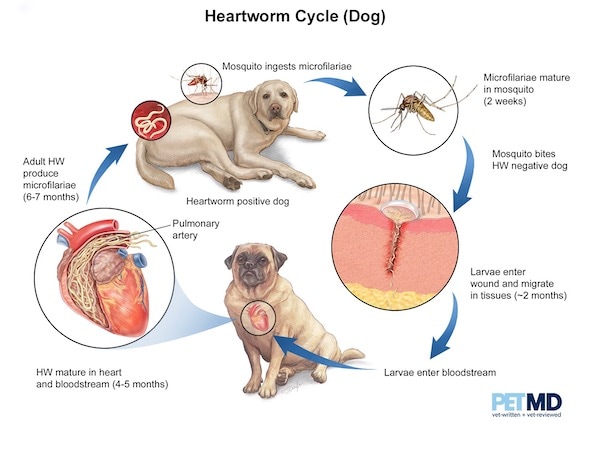Treating Heartworms in Dogs and How is Disease Treated?

Your beloved furry friends are natural hosts to heartworms. Heartworms (Dirofilaria immitis) are parasitic roundworms, and their hosts are cats as well as dogs. If your furry friends are not on a pet prescription heartworm prevention program, they can get infected with the parasite through a mosquito bite.
It’s important to treat heartworm disease as it can result in serious health consequences and even death. Therefore, keeping your beloved dog on continuous heartworm prevention is what you can do for your pet.
We at Petsfleet are here to guide you all about heartworm disease in dogs and how you can treat it. So, let’s dive straight into it.
What is Heartworm Disease?
Before knowing further details, first, you should understand what heartworm disease is.
Heartworm is a disease caused by a parasitic worm called Dirofilaria immitis, which enters a dog’s bloodstream through a mosquito bite. It’s not contagious, as only mosquito bites can pass it. However, it doesn’t mean the risk of heartworm is low.
After a mosquito infection in dogs, the worms will grow into adults, mate, and produce offspring while inhabiting your pet’s lungs, heart, and blood vessels.
Adult heartworms have a life of five years. During their lives, female worms produce millions of offspring called microfilariae that live in small bloodstream vessels.

How is Heartworm Disease Treated?
Although fatalities are rare, treating heartworms in dogs comes with some risks. Earlier, the drug used for heartworm disease treatment contained high arsenic levels, leading to toxic side effects. But recently, a new drug has been used for treatment without causing any side effects, and the success rate is 95% in dogs.
At the time of diagnosis in canines, the disease has already become progressive. That means the heartworms caused enough damage to the lungs, blood vessels, kidneys, heart, and liver.
Medications
For Microfilariae:
Before killing adult heartworms, a drug is given to canines to kill microfilariae (heartworm larvae). Your dog may be observed in the hospital once the medication is administered. The drug is administered before or after the injections for adult heartworms.
For Adult Heartworms:
Melarsomine (ImmiticideÒ), an injectable drug, effectively kills adult heartworms. This drug kills all the adult heartworms in the heart and adjacent vessels and is administered in a series of injections. Your veterinarian will determine the specific injection schedule depending on your canine’s condition.
Most dogs receive a first injection, a 30-day rest period, two more injections 24 hours apart, and a third injection. Melarsomine can result in muscle pain; therefore, dogs are also given pain medication.
Surgery
In some cases, it’s better to treat organ damage than to kill the heartworms that bring negative effects. Dogs in such conditions live only a few weeks or months. Sometimes, surgery is necessary to remove the worms from the heart and lung vessels. Unfortunately, some dogs may die regardless of treatment.
Exercise Restriction
Exercise restriction is necessary for the successful treatment of heartworms in dogs. The adult worms start dying within a few days and begin to decompose. Once they are broken up, worms are reabsorbed by the body from the lungs. This resorption takes place within weeks to months.
Most post-treatment complications occur due to these fragments of dead heartworms. This period is critical; that’s why keep your dog at complete rest and don’t let him exercise for one month till the final injection of treatment.
The first week after each injection is when the worms die, making this time critical. In severely infected dogs, a cough is noticeable after treatment for seven to eight weeks. However, prompt treatment is needed if your dog shows a significant reaction within a few weeks of the initial treatment.
Consult with your vet if your dog shows the following symptoms:
- Severe coughing
- Coughing up blood
- Shortness of breath
- Loss of appetite
- Fever
- Depression
In these cases, antibiotics, cage rest, supportive care, anti-inflammatories, and intravenous fluids are effective for treatment.
Are Any Other Treatments Essential?
Prednisone is a corticosteroid prescribed to reduce complications of dying microfilariae or heartworms. Even after killing heartworms, some canines need lifelong treatment for heart failure, including diuretics and heart medications like beta-blockers or cardiac glycosides, ACE inhibitors, and low-sodium diets.
After one or nine months of the last injection of Melarsomine, dogs are tested for microfilariae and adult heartworms. In the case of positive results, the treatment is modified.
Conclusion
Heartworm is an awful disease in dogs and cats caused by a parasite. The parasite enters your dog’s body through a mosquito bite, affecting the circulatory system. The treatment includes using multiple medications, surgery, and exercise restriction. However, the risks can’t be neglected in this regard. Luckily, no more pets have to suffer this dreaded disease due to the availability of safe and economical preventives.
If you want to know what myositis is and its treatment and prevention in dogs, we are here to help.
FAQs Regarding Treating Heartworms in Dogs
Can Dogs Die After Heartworm Treatment?
Heartworm treatment in dogs is usually successful, but the risk can’t be ignored. Sometimes, complications can occur, including the possibility of death. However, the risk of death due to heartworm treatment is comparatively lower than that of untreated heartworm disease, which is often fatal.
Can Heartworm Treatment Shorten a Dog’s Life?
Generally, dogs that are asymptomatic for heartworm disease live a long, healthy life without any symptoms after treatment. However, canines sick with heartworm disease and having symptoms have a poorer prognosis with treatment.
What is the Survival Rate of Heartworm Treatment in Dogs?
The overall prognosis is less advantageous for dogs with heart failure or caval syndrome. However, the treatment can still be successful. The 3-injection protocol of Melarsomine effectively kills 98% of the adult worms.
How Can I Prevent My Dog From Getting Heartworms?
You can prevent your furry friend from getting heartworms using a heartworm preventive. After successful heartworm treatment, starting a heartworm prevention program is crucial to avoid future recurrence. Contact your vet to know which preventive program will work for your dog.






